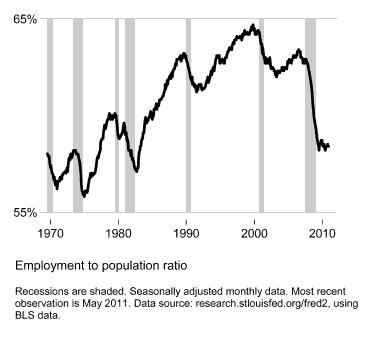“After a recession, this economy usually gets people back to work quickly. Not this time.” That’s Clive Crook in a recent FT column.
Actually, the lack of employment recovery since the official end of the great recession looks quite similar to what happened in the early 1990s and early 2000s (more data here, here, here).

If the degree of employment recovery is our signal, at this point we might indeed forecast a lost business cycle (“decade”), as in the 2000s, with the employment rate never even reaching its previous peak. But we might just as reasonably hope for a very healthy upturn, as in the 1990s.
We should be worried not just because employment growth so far has been sluggish, but also because: (1) This recession was much more severe than the previous two. We have a good bit more ground to make up. (2) Output may recover more slowly than in the past. Heavy household debt and the collapse of home values are likely to hamper consumption growth, and the Fed and Congress seem unwilling to further stimulate the economy. (3) The pattern of the 2000-07 business cycle may indicate a fundamental shift in employer practices, with greater reluctance to hire and eagerness to fire.
Disclaimer: This page contains affiliate links. If you choose to make a purchase after clicking a link, we may receive a commission at no additional cost to you. Thank you for your support!



Leave a Reply